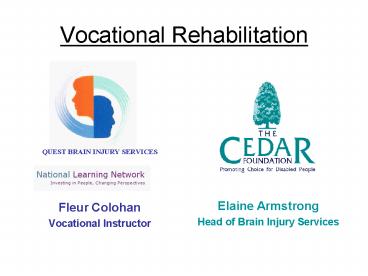Vocational Rehabilitation - PowerPoint PPT Presentation
1 / 19
Title:
Vocational Rehabilitation
Description:
Vocational Rehabilitation QUEST BRAIN INJURY ... agreed Personal Action Plans Specific targeted feedback that is solutions focused Giving a safe environment ... – PowerPoint PPT presentation
Number of Views:921
Avg rating:3.0/5.0
Title: Vocational Rehabilitation
1
Vocational Rehabilitation
- QUEST BRAIN INJURY SERVICES
- Fleur Colohan
- Vocational Instructor
- Elaine Armstrong
- Head of Brain Injury Services
2
Purpose Statement
- Our services aim to provide training and support
for people with acquired Brain Injury in the
following areas - Personal Development
- Community Integration
- Further Training/Education
- Vocational Opportunities
3
Model of Service Delivery
- Assessment Planning
- Direct Training/Rehabilitation
- Community Based Vocational Case Management
4
Assessment Planning
- Referral
- An agreed pathway for referral either from a
specific community brain injury team or a range
of sources. - Assessment
- Sourcing relevant information to identify social
and vocational aspirations and support needs - Individual Action Plan
- Documenting what will be delivered, within a
specific timescale, with responsibilities
allocated and a review schedule agreed
5
Direct Training/Rehabilitation
- Delivered in one to one support sessions or small
groups to develop practice skills for community
integration - Brain Injury Awareness
- Cognitive Rehabilitation
- Behaviour Management
- Communication/Interpersonal skills
- Independent Living skills
- Learning skills and strategies
- IT and administrative skills
- Preparation for Work (career exploration, job
seeking, interview skills, work related
behaviour) - Travel Training
- Stress Management
- Essential Skills (literacy numeracy)
6
Community Based Vocational Case Management
- Training
- Vocational Training
- Education Courses
- Hobby Courses Interest Groups
- Vocational
- Vocational profiling job matching
- Work Experience Placements
- Job Retention (linking with previous employers)
- Voluntary Work
- Support
- Personal goal setting/career development planning
- Job support on site
- Brain Injury Awareness Training on-site
7
- QUEST TRAINING CENTRE
- Location Galway city retail park
- Staff Co-ordinator, Psychologist 4
Instructors (2 F/T, 2 P/T) - Access to counsellor
- Clients 17 Clients (F/T)
- Outreach Aftercare Service (30 clients)
8
- ROLE OF VOCATIONAL INSTRUCTOR
- Profiling and assessment
- Work attitudes
- Job Seeking skills
- Career Exploration
- Work Experience Placement
9
- COMMUNITY WORK EXPERIENCE PLACEMENTS
- Profiling, job Matching
- Early placement (where possible)
- Continued linkage with the Team and Centre
- Utilisation of external agencies e.g. Fas etc.
- Support on site
- Employer education
10
Cedar Foundation Vocational Rehabilitation
- Regional Service
- 8 services across Northern Ireland
- Staff resource
- 2 full-time staff posts, with admin support
- Clients
- 20 service users
- 2 year programme (2 year follow up contact)
- Delivered in partnership with Health Social
Services Brain Injury specialist staff - (neuropsychology, social work, OT, physiotherapy,
speech language)
11
Cedar Foundation Vocational Rehabilitation
- Vocational Rehabilitation Officer
- Pre-vocational skills training
- Application of learning to community placements
- Vocational Case Manager
- Preparation for work
- Securing and supporting training courses and work
placements in local educational, community and
employment settings - Employer support and training
12
Entry Criteria
- An acquired or traumatic Brain Injury
- Be resident within the funding region
- Aged between 16 65 years
- Permit access to all relevant information
- Have the ability, motivation and potential to
benefit from the programme - Be medically stable
- Be free from alcohol drugs, which would prevent
full participation in the programme - Be able to access the centre
13
Vocational Rehabilitation -Benefits
- Improved health and social well-being
- A personal development/career plan
- Enhanced vocational skills
- Vocational qualifications
- Relevant work experience
- Improved job search interview techniques
- A support network facilitating inclusion
14
Vocational Rehabilitation General Challenges I
- At programme level
- Lack of awareness of brain injury among employers
- Insurance issues
- Benefits/welfare challenges
- Compensation Claim process
- Sourcing host placement companies competition
from other agencies
15
Vocational Rehabilitation General Challenges II
- At strategic level
- Recognising and measuring progress for
funders/service users/families (eg measuring
softer outcomes) - Sustainability of outcomes lack of
funding/resources for follow up - Long term vs time limited programmes
16
Vocational Rehabilitation Personal Challenges
- Brain Injury Related issues that relate to
sustainability of outcomes - Irritability Memory Fatigue
- Impulsivity Concentration Mobility
- Motivation Insight Social Skills
- Reasoning Epilepsy Depression
- Speed of Information Processing Stress
Management - External Factors
- Family concerns expectations
- Financial implications
- Access to transport
17
Management Solutions
- Employer related tips
- Approach by phone or face to face
- Leave a leaflet of BASIC information
- Explain supports available and the benefits the
experience will afford both the employer and
employee - Liaise closely with family, relevant
professionals and support networks - Be honest with both employer and client
- Actively support the client to apply compensatory
strategies to the work context - Keep close contact with co-workers
18
Management Solutions
- General Tips
- Clear, agreed Personal Action Plans
- Specific targeted feedback that is solutions
focused - Giving a safe environment to reality test new
compensatory strategies or roles - Develop natural supports
19
Success Factors
- Partnership working
- Pre-vocational preparation
- Active application of learning
- Specialist Staff training
- Brain Injury Awareness Training
- Solutions Focus
- Peer support
- Maximising opportunities to utilise residual
skills - Monitoring Review
- Structure, Routine and Consistency































